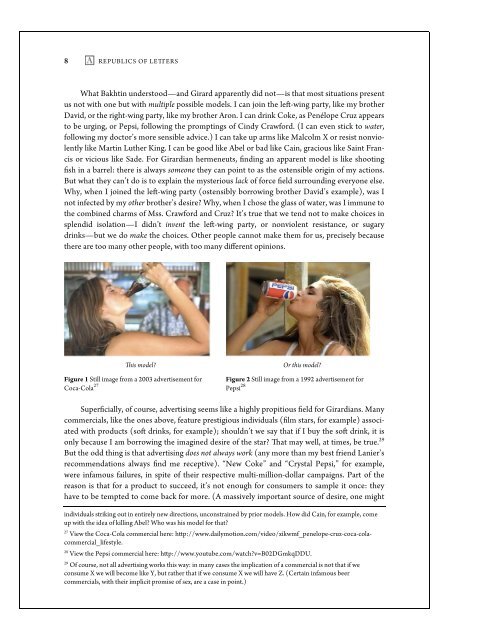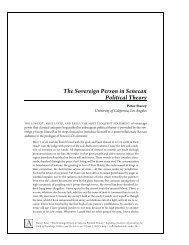Deceit, Desire, and the Literature Professor: Why Girardians Exist
Deceit, Desire, and the Literature Professor: Why Girardians Exist
Deceit, Desire, and the Literature Professor: Why Girardians Exist
Create successful ePaper yourself
Turn your PDF publications into a flip-book with our unique Google optimized e-Paper software.
8 REPUBLICS OF LETTERS<br />
What Bakhtin understood—<strong>and</strong> Girard apparently did not—is that most situations present<br />
us not with one but with multiple possible models. I can join <strong>the</strong> left-wing party, like my bro<strong>the</strong>r<br />
David, or <strong>the</strong> right-wing party, like my bro<strong>the</strong>r Aron. I can drink Coke, as Penélope Cruz appears<br />
to be urging, or Pepsi, following <strong>the</strong> promptings of Cindy Crawford. (I can even stick to water,<br />
following my doctor’s more sensible advice.) I can take up arms like Malcolm X or resist nonviolently<br />
like Martin Lu<strong>the</strong>r King. I can be good like Abel or bad like Cain, gracious like Saint Francis<br />
or vicious like Sade. For Girardian hermeneuts, finding an apparent model is like shooting<br />
fish in a barrel: <strong>the</strong>re is always someone <strong>the</strong>y can point to as <strong>the</strong> ostensible origin of my actions.<br />
But what <strong>the</strong>y can’t do is to explain <strong>the</strong> mysterious lack of force field surrounding everyone else.<br />
<strong>Why</strong>, when I joined <strong>the</strong> left-wing party (ostensibly borrowing bro<strong>the</strong>r David’s example), was I<br />
not infected by my o<strong>the</strong>r bro<strong>the</strong>r’s desire? <strong>Why</strong>, when I chose <strong>the</strong> glass of water, was I immune to<br />
<strong>the</strong> combined charms of Mss. Crawford <strong>and</strong> Cruz? It’s true that we tend not to make choices in<br />
splendid isolation—I didn’t invent <strong>the</strong> left-wing party, or nonviolent resistance, or sugary<br />
drinks—but we do make <strong>the</strong> choices. O<strong>the</strong>r people cannot make <strong>the</strong>m for us, precisely because<br />
<strong>the</strong>re are too many o<strong>the</strong>r people, with too many different opinions.<br />
This model? Or this model?<br />
Figure 1 Still image from a 2003 advertisement for<br />
Coca-Cola 27<br />
Figure 2 Still image from a 1992 advertisement for<br />
Pepsi 28<br />
Superficially, of course, advertising seems like a highly propitious field for <strong>Girardians</strong>. Many<br />
commercials, like <strong>the</strong> ones above, feature prestigious individuals (film stars, for example) associated<br />
with products (soft drinks, for example); shouldn’t we say that if I buy <strong>the</strong> soft drink, it is<br />
only because I am borrowing <strong>the</strong> imagined desire of <strong>the</strong> star? That may well, at times, be true. 29<br />
But <strong>the</strong> odd thing is that advertising does not always work (any more than my best friend Lanier’s<br />
recommendations always find me receptive). “New Coke” <strong>and</strong> “Crystal Pepsi,” for example,<br />
were infamous failures, in spite of <strong>the</strong>ir respective multi-million-dollar campaigns. Part of <strong>the</strong><br />
reason is that for a product to succeed, it’s not enough for consumers to sample it once: <strong>the</strong>y<br />
have to be tempted to come back for more. (A massively important source of desire, one might<br />
individuals striking out in entirely new directions, unconstrained by prior models. How did Cain, for example, come<br />
up with <strong>the</strong> idea of killing Abel? Who was his model for that?<br />
27 View <strong>the</strong> Coca-Cola commercial here: http://www.dailymotion.com/video/xikwmf_penelope-cruz-coca-colacommercial_lifestyle.<br />
28 View <strong>the</strong> Pepsi commercial here: http://www.youtube.com/watch?v=B02DGmkqDDU.<br />
29 Of course, not all advertising works this way: in many cases <strong>the</strong> implication of a commercial is not that if we<br />
consume X we will become like Y, but ra<strong>the</strong>r that if we consume X we will have Z. (Certain infamous beer<br />
commercials, with <strong>the</strong>ir implicit promise of sex, are a case in point.)



